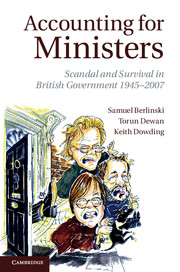Book contents
- Frontmatter
- Contents
- List of figures
- List of tables
- Preface and acknowledgements
- 1 Introduction
- 2 Managing the cabinet: principal–agent relations in government
- 3 The structure of British government
- 4 Who serves in government and how long do they last?
- 5 The prime minister and cabinet
- 6 Performance measures and forced exits
- 7 Ministerial performance and tenure
- 8 Conclusion
- References
- Index
2 - Managing the cabinet: principal–agent relations in government
Published online by Cambridge University Press: 05 April 2012
- Frontmatter
- Contents
- List of figures
- List of tables
- Preface and acknowledgements
- 1 Introduction
- 2 Managing the cabinet: principal–agent relations in government
- 3 The structure of British government
- 4 Who serves in government and how long do they last?
- 5 The prime minister and cabinet
- 6 Performance measures and forced exits
- 7 Ministerial performance and tenure
- 8 Conclusion
- References
- Index
Summary
In a now-famous book, the late William Riker offered a critical assessment of the ability of liberal democracies to craft policies that reflected the will of the public. Using the insights of social choice theory, Riker argued that politics was inherently susceptible to the whims and strategic calculations of agenda-setters, and challenged what he called the ‘populist’ view of government that policy outcomes reflect the desires of citizens (Riker, 1982). Riker offered an alternative, liberal view of democracy, in which democracy is effective because it provides the institutional means by which citizens can hold to account those elected to power.
Riker's definition of liberal democracy draws on the writings of some of the great liberal philosophers of the Enlightenment whose interest was in understanding the proper function of government. Hume (1742/1978), for example, believed that government would be effective only when power was kept in check. It was not enough to rely on the good intentions of those who stood for office and better to set up a system of governance based on an assumption that those holding public office were knaves.
Of course, we need not take such a dim view of the motives of politicians to hold the liberal view of democracy. Suppose that one took an arguably more realistic view that although some politicians enter the profession for the noblest of reasons, some do not. Moreover, even public-spirited servants may succumb to temptation and take actions in the service of narrow private interests.
- Type
- Chapter
- Information
- Accounting for MinistersScandal and Survival in British Government 1945–2007, pp. 6 - 20Publisher: Cambridge University PressPrint publication year: 2012



